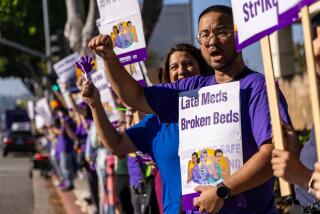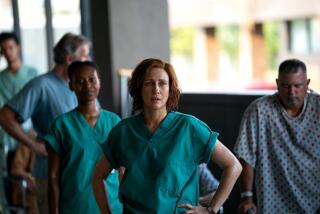Esther Hawk
When Esther Hawk went into nursing 43 years ago, her main duties were to comfort the patients, put everything back in the exact place she found it, and always--always!--stand up when a doctor entered the room. It was definitely a different world back then, says the 64-year-old Solana Beach resident, who recently retired as vice president of patient services at Scripps Memorial Hospital-La Jolla. During her 23 years at Scripps, Hawk served as a continuing education instructor, responsible for the orientation and continuing education of all nursing personnel, and as the hospital’s first day-nursing supervisor. In 1969, she was named assistant director of nursing, a position she held for 10 years. Prior to Scripps, Hawk served as a Navy nurse during the Korean War, helping to treat wounded servicemen after they were unloaded from hospital ships. She is a graduate of the old San Diego County General Hospital school of nursing, which is now UC San Diego Medical Center. Times staff writer Caroline Lemke interviewed Hawk in her home and Vince Compagnone photographed her.
I really don’t know why I became a nurse. When I was a little girl I was torn between three ambitions. I used to say, “I’m going to smoke Lucky Strikes, and I’m going to be a telephone operator or a nurse.” I don’t smoke, never have smoked, and I’ve since come to hate telephones, but I can honestly say I’m proud to be a nurse.
At that time, to become a nurse you went to a county hospital and you went into a three-year school. You were there to work. You paid your own way, really. We would get up in the morning and work on the wards from 7 to 11, come off and have lunch for half an hour, then go to class until 3:30 in the afternoon, then go back on the wards until 7 at night.
It was pretty cheap labor. But you have to realize, at that time we were in a war. We think we have a nursing shortage now, but believe me, there was a nursing shortage then. I don’t know how the hospitals would have functioned if we didn’t have student nurses.
This might sound funny, but simple things we take for granted today--like EKGs--that was a big deal. A nurse in my day would never do that. What we really learned to do were comfort measures. We were trained. The nurses now are educated.
They didn’t have intensive-care units back then. If someone had a heart attack, you wondered how they lived. They didn’t live. That’s the difference between then and now.
I joined the Navy in 1949. You hear the saying, “Join the Navy and see the world.” Well, I joined the Navy and went 15 blocks from my home in Long Beach, all the way to the Long Beach Naval Hospital.
When the hospital closed in 1950, I came down to San Diego. From here I went to Guam, then up to Japan while it was still under the occupancy.
It was kind of antiquated in Guam. I worked in the military hospital’s pediatric and sick officer’s unit. The hospital was Quonset huts with no air conditioning, just a lot of fans. We had a typhoon one New Year’s Eve day and we had to evacuate the hospital because in a typhoon, the Quonset huts would blow over.
The only solid barracks were the Marine barracks, so we transported all our patients there. The wind was blowing so hard you had to tie a rope around you and hang onto ropes to get from building to building. You could see the palm trees bend in half because of the winds.
In Guam, the big hospital ships would dock at 7:30 in the morning with 2,500 to 3,000 patients, and by 7 o’clock that night, all those patients would have been triaged, put to bed and at least fed. Then surgery would start and they would go three to four days in a row, 24 hours a day.
I think that my first impression of war--and this was just the Korean War, which was nothing compared to World War II--was that I had never seen that many young people in a hospital and it just made my heart go cold. They were all around my age. All you have to do is walk through the halls of any military hospital right after a hospital ship has divvyed out to know how useless war is. It was terrible, it was a real shock.
The thing I liked least about nursing is that sometimes, no matter how you tried and tried, the patient would die. With the youngsters, it’s especially hard. When that happens, it takes something from you. I don’t think any nurse gets used to it. I think we all come to some sort of reconciliation that there is something bigger and higher than us, but it’s still hard.
More to Read
Sign up for Essential California
The most important California stories and recommendations in your inbox every morning.
You may occasionally receive promotional content from the Los Angeles Times.










